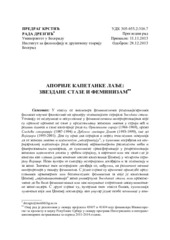Aporije kapetanke lađe: Zvezdane staze i feminizam
Aporie of a Ship Capitainess : Star Trek and Feminism
| dc.creator | Krstić, Predrag | |
| dc.creator | Drezgić, Rada | |
| dc.date.accessioned | 2017-11-01T10:16:45Z | |
| dc.date.available | 2017-11-01T10:16:45Z | |
| dc.date.issued | 2013 | |
| dc.identifier | 1820-4589 | |
| dc.identifier.uri | http://rifdt.instifdt.bg.ac.rs/123456789/784 | |
| dc.description.abstract | This text explores feminist reception of science fiction, particularly the television series Start Trek. The authors point out differences in feminist interpretations of female characters and gender identities as well as changes that took place in that respect in various installments of the series. It is argued that the first two installments – The Original Series (1966-1969) and The Next Generation (1987- 1994) – recreated the patriarchal gender ideology which was marked by unequal power distribution and male privilege, despite some obvious attempts to ”modernize”female characters and identities. More substantial changes in terms of representing female identities began with the third installment – The Deep Sky Nine (1993-1999). These changes became particularly and, at last, prominent in the fourth installment – The Voyager (1995-2001) – when the main character, the captain, finally became captainess Janeway. Some authors consider this to be a historical event for both women and the television. Feminist theory, however, variously interprets the meaning of this historical event. For fierce hard-line critics, the ”most emancipated”woman of the Star Trek universe, captainess Janeway, is either too feminine to be a feminist, or too much masculine – a stereotype actually of a masculinized female leader. There are, however, other more subtle interpretations, embraced in this text, which treat Janeway as a hybrid. Her masculine and feminine features are intentionally put in conflict, side by side, in order to avoid any ”gendered stigmatization”. The vessel that she commands thus represents a ”feminist heterotopia” where incompatible things, people and situations can be placed next to each other. | srp |
| dc.description.abstract | У тексту се анализира феминистичка рецепција/критика филмске научне фантастике на примеру телевизијског серијала Звездане стазе. Уочавају се недоумице и несугласице у феминистичким интерпретацијама које су пратиле промене не само у представљању женских ликова у серији већ и родних односа и саме категорије рода од Оригиналне серије (1966-1969), преко Следеће генерације (1987-1994) и Дубоког свемира Девет (1993-1999), све до Војаџера (1995-2001). Док су прва два серијала и поред очигледних покушаја да се женски ликови и идентитети „модернизују”, у суштини изграђена на патријархалној идеологији рода обележеној неравномерном расподелом моћи и фаворизовањем мушкараца, до суштинске трансформације у репрезентацији женских идентитета долази у трећем серијалу, а нарочито или тек тамо где је капетан као главни јунак коначно постао капетаница Џеневеј у четвртом серијалу Војаџер. Неки аутори то сматрају историјским догађајем и за телевизију и за жене. Значење овог историјског догађаја се, међутим, на различите начине интерпретира у оквиру феминизма. С једне стране су критичке примедбе представника правоверног или беспоштедног феминизма за које је капетаница Џеневеј „најеманципованија” жена универзума Звезданих стаза, или преженствена да би била феминисткиња или пак испуњење стереотипа маскулинизоване жене-лидера. С друге стране су, ауторима овог текста ближа, суптилнија тумачења која лик Џеневеј посматрају као унутар једне особе хотимице у конфликт стављене феминизоване и маскулинизоване особине да би се избегла „стигма родности”. Следствено томе, лађа којом она командује постаје „феминистичка хетеротопија” у којој инкомпатибилне ствари, људи и ситуације могу бити постављени једни уз друге, чинећи тако модел за једну нову концепцију заједнице, породице, рода и расе, какве можда могу да функционишу у будућем свету. | sr |
| dc.format | 10 20 (2013) 161-184 | |
| dc.language | sr | |
| dc.relation | info:eu-repo/grantAgreement/MESTD/Integrated and Interdisciplinary Research (IIR or III)/43007/RS// | |
| dc.relation | info:eu-repo/grantAgreement/MESTD/Integrated and Interdisciplinary Research (IIR or III)/41004/RS// | |
| dc.rights.uri | https://creativecommons.org/licenses/by-nc-nd/4.0/ | |
| dc.source | Kultura polisa : časopis za negovanje demokratske političke kulture | srp |
| dc.subject | Star Trek | |
| dc.subject | science fiction | |
| dc.subject | научна фантастика | |
| dc.subject | Звездане стазе | |
| dc.subject | феминизам | |
| dc.subject | род | |
| dc.subject | идентитет | |
| dc.subject | хибридност | |
| dc.title | Aporije kapetanke lađe: Zvezdane staze i feminizam | sr |
| dc.title | Aporie of a Ship Capitainess : Star Trek and Feminism | eng |
| dc.type | article | |
| dc.rights.license | BY-NC-ND | |
| dcterms.abstract | Дрезгић, Рада; Крстић, Предраг; Aпорије капетанке лађе: Звездане стазе и феминизам; Aпорие оф а Схип Цапитаинесс: Стар Трек анд Феминисм; | |
| dc.citation.issue | 20 | |
| dc.citation.volume | 10 | |
| dc.citation.spage | 161 | |
| dc.citation.epage | 184 | |
| dc.type.version | publishedVersion | |
| dc.identifier.fulltext | http://rifdt.instifdt.bg.ac.rs/bitstream/id/4657/bitstream_4657.pdf | |
| dc.identifier.rcub | https://hdl.handle.net/21.15107/rcub_rifdt_784 |

